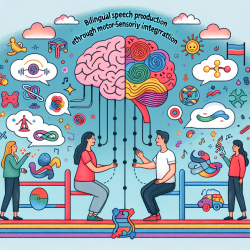Empowering Change: Harnessing Research to Combat Non-Communicable Diseases
As practitioners dedicated to improving outcomes for children, it's crucial to stay informed about the latest research and trends in health. A recent study, "Trends in mortality due to non-communicable diseases in the Brazilian adult population: national and subnational estimates and projections for 2030," provides valuable insights into the evolving landscape of non-communicable diseases (NCDs) in Brazil. This research is not only relevant to public health professionals but also to those of us in the field of speech-language pathology, as it underscores the importance of data-driven decisions in shaping therapeutic practices.
Understanding the Research
The study analyzed mortality trends and disability-adjusted life years (DALYs) lost due to NCDs, including cardiovascular diseases, chronic respiratory diseases, neoplasms, and diabetes, from 1990 to 2017. It highlighted a significant reduction in mortality rates due to NCDs, with a 35.3% decrease from 509.1 deaths per 100,000 inhabitants in 1990 to 329.6 in 2017. However, the study also noted a concerning reversal in this trend after 2015, indicating potential challenges in achieving the Sustainable Development Goals related to NCDs by 2030.
Implications for Practitioners
For speech-language pathologists, understanding these trends is vital. NCDs can impact communication abilities, and being aware of the broader health context can inform our therapeutic approaches. Here are a few ways practitioners can leverage this research:
- Integrate Health Education: Incorporate discussions about lifestyle choices, such as diet and physical activity, into therapy sessions. Educating children and their families about these factors can help mitigate the risk of NCDs.
- Collaborate with Healthcare Providers: Work closely with other healthcare professionals to ensure a holistic approach to managing NCDs, particularly in cases where communication disorders are linked to underlying health issues.
- Advocate for Policy Changes: Use the data from this study to advocate for policies that support healthy environments, such as reduced exposure to tobacco and increased access to nutritious foods.
Encouraging Further Research
This study serves as a call to action for practitioners to engage in further research. By contributing to the body of knowledge on NCDs and their impact on communication, we can better tailor our interventions to meet the needs of our clients. Consider partnering with academic institutions or participating in professional networks to explore these topics further.
To read the original research paper, please follow this link: Trends in mortality due to non-communicable diseases in the Brazilian adult population: national and subnational estimates and projections for 2030.
Conclusion
By staying informed and proactive, we can make a significant impact on the health and well-being of the children we serve. This research highlights the importance of data-driven decisions and collaborative efforts in addressing the challenges posed by NCDs. Together, we can work towards a healthier future for all.










